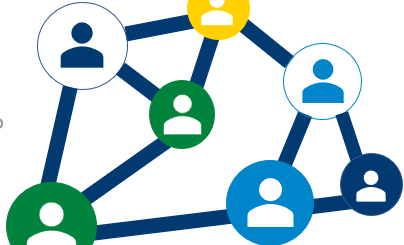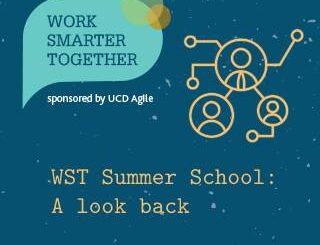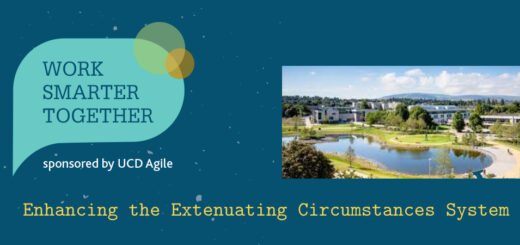A new staff perspective on getting involved in the UCD Community
Being a new starter in UCD can be a daunting experience. The transition to remote working, and now hybrid, has made it even more challenging to connect with staff outside your direct team. That being said, there are many opportunities to get engaged with others across campus who have similar interests and roles as you. Some of these opportunities come in the form of well established Communities of Practice. Others are more informal networks of staff.
For this article, I reached out to two colleagues who have recently started working in UCD. Simon Gray is a member of the Student Advisers and works in the Arts & Humanities area. Ruth Mcguinness is a member of the UCD Finance team. In different ways, both of them have found themselves connected with different groups, engaged in different activities outside their immediate teams, and contributing to the wider community.

- When did you first join UCD and what was that experience like? Were the immediate team fully remote or hybrid at the time?
Simon – I joined UCD proper in January 2022. (I say “proper” because I had spent 4 years on the outskirts of UCD, so to speak, teaching at the International Study Center. This allowed me to observe and learn, from afar, the general organisational layout of the university.)
My team was, and is, operating on a hybrid model; since I joined there has been a great deal of flexibility, understanding and support for all staff, from those who prefer to be on-campus to those who prefer to work from home – and everyone in between. Long may it last. As a former owner of an online business, I have long been aware of the ease and benefits of working from home; the one good thing about COVID is that it has brought businesses, institutions and government round to this way of thinking. I believe it is the employers who recognise and move with this new reality who will thrive.
Ruth – I joined UCD in June 2022, right after the mass exodus for the Summer, so a really quiet, peaceful time to get to know the Campus.
From the get-go, my team was operating a hybrid model (50% onsite) and still is. In the past, I have had a high level of flexibility in terms of work location so this was nothing new for me in terms of working style but I was concerned about missing that initial face to face interaction which I find forms stronger relationships, so I prioritised seeking out those moments when I was onsite. I think it’s amazing to see this flexibility become mainstream in Ireland over the last few years. I live in rural Co. Wexford, so being able to work in a fantastic Institution like UCD, while also being able to live where my community is, is really fulfilling and a huge benefit to rural Ireland.
- What steps did you take to get involved with the communities? Were you proactive or were you invited? What was your experience making contact and joining?
Simon – My role by its very nature requires a cross-departmental approach. I knew from day one that this role was not one which would be confined to a single office or department. To advise students effectively, I and each of my colleagues in every college need to get out and establish relationships with academics, support staff and important decision makers and implementers. For most of us Advisers that starts with the College/School Office in our college, and the College Office in Arts & Humanities have been a wonderfully friendly and efficient gateway into the larger community here in Newman. From there I got to know departments, academic staff and central administrative decision-makers around campus.
After a couple of months I had gotten used to the dynamic demands of my role and had more or less learned the outlines of the slightly Byzantine organisational structure in UCD.
Several opportunities then came up to simultaneously learn and meet new colleagues; most of these opportunities had been appearing in my indispensable Culture & Engagement e-Zine.One such opportunity listed was a Working Smarter Together Summer School online seminar sponsored by UCD Agile. One such opportunity was the Working Smarter Together online seminar set up by UCD Agile. There I met several like-minded people and got involved in at least one promising cross-functional group, where I can go beyond my role and help make a positive contribution to solving problems across campus.
Ruth – Similar to Simon, my role involves interacting with a wide audience across the University and requires a strong comprehension of the operations of the University. I really value cross-functional teams for their integration of diverse skill sets, I always learn new ways of working or thinking on a cross-functional team, and I get a lot of self-esteem from helping others by sharing my expertise also.
I was proactive in seeking out cross-functional communities within the University that I thought I could get involved in and would have the knock-on effect of deepening my understanding of the operations within the University which would help me in my role. I asked my colleagues in the Finance Office which communities they were involved in and who I should get in touch with to ask to join and that’s what I do. Once I was invited to one group, I did the same thing, I sought out one individual in the group that I could tell was quite involved and asked them, which communities do they recommend I get involved in and who I should talk to about them. It’s daunting putting yourself out there the first time but if you are clear in your motivation for joining the group then you just go for it!
- How have you found being connected into these communities has helped you in your role? Do you think that it has brought immediate value to you in your day-to-day?
Simon – I’m an introvert, and I still like my time alone, but I know the lifeblood of my role is collaboration and knowledge sharing.
Personally, I have gotten great value not only from meeting new colleagues, but from being able to break up the day by getting up and going out to meet someone. As a result, I feel a part of the community (long may it last!) and am not in a role where I’m chained to a desk. The ultimate beneficiaries of all these relationships, however, are the students in Arts & Humanities whom I am trying to help. Each one of us in the UCD community has a part to play in students’ success (after all, why else are we here?). The more connections I have, and the more I understand about each person or sub-community in UCD, the quicker and better informed is the guidance I can give to each student towards success.
Ruth – Absolutely. By making connections with a wider community, I can better contextualise elements of my own role, make better decisions by having a wider perspective and ultimately feel more connected to the University as a whole by giving and receiving from colleagues outside my area. Being more connected has increased my motivation in work, so that enhances my day job but also it has broadened my understanding of the University which really adds value to my role.
- What would your advice be to any new members of the UCD community who might be interested in getting involved in/connected into communities of practice across UCD?
Simon – Be curious. Your first year is a great (and [in my experience], possibly the only) opportunity to ask questions which might seem silly. Questions like “What happens over there?”, “Why do we do it this way?” will at the very least save you a lot of hassle in the long-term and, at the very most, give your established colleagues a chance to re-think or justify the way things are done around here. People love to talk about themselves; it’s innate to us all. So asking a newly-introduced colleague pointed questions like “What do you do? What exactly does that involve?” could create a connection that lasts a long time. But no one here is just a UCD employee. They have families, hobbies, passions, weekend plans, etcetera. UCD is supposed to be a community, which starts with the bonds – professional and human – that we make with each other. In my experience, a chat over coffee is the best place to start!
Ruth – Be proactive and say yes! You can always excuse yourself later if the group isn’t a good fit for you but once you start saying no, the invitations dry up very quickly. Speak to colleagues and ask them if there are any groups they know of that you could get involved in and then reach out to the organisers. The worst that can happen is someone says no, and I find when I put myself out there, people rarely say no. Trust that your skills are valuable and you have something to share, be generous with your time and others will be generous with theirs. Who knows what you will learn and the people you will meet. I never say no when asked for a coffee and if I want to make a new connection that’s where I like to start.



